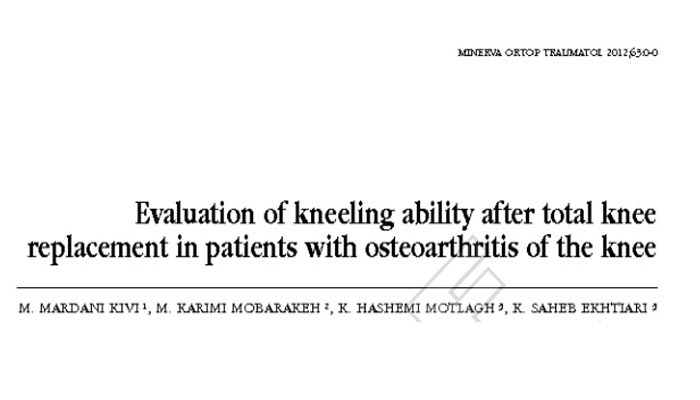- تاریخ درج : ۲۴ فروردین ۱۳۹۶
- تعداد بازدید: 2531
- نویسنده : dr.mohsen mardani-kivi
-

Aim. The ability to kneel plays a crucial role in the daily events. The lack of literature addressing the patients concerns regarding the capacity, to which they will be able to function post-operatively, motivated us to investigate this issue further.
Methods. In this cross-sectional longitudinal study, all patients with knee osteoarthritis whom had total knee arthroplasty (TKA) were evaluated for eligibility from the years 2007-2010. All procedures using a midline skin incision followed by medial parapatellar arthrotomy without re-surfacing of the patella and with PCL substituting prostheses. Knee Society Score (KSS), Functional Knee Score (FKS), VAS, and kneeling ability, were evaluated, preoperatively, 1-year postoperative, and again during final follow-up. Statistical analysis was interpreted using SPSS software.
Results. Of 114 cases, 69 were female (60.5%), 45 were male (39.5%), with a mean age of 67.9±6.2 years (52 to 81) and mean follow-up range of 26.7±2.4 months (14 to 44). VAS, KSS and FKS were significantly higher at both 1-year and long-term follow-up than those taken before surgery (P<0.0001). Before surgery 76 patients (66.7%) could not kneel, out of which 59 patients (77.6%) reported this inability because of reasons relating to the knee. Of these, 42 cases (71.2%) found it possible to kneel again without pain or discomfort. With regards to preoperative kneeling ability versus postoperative, there is a statistically significant positive relationship between TKA and regaining the ability to kneel (P<0.0001).
Conclusion. It seems that the resultant decreased pain and increased function in knee flexion leads to strengthening of kneeling ability.
-